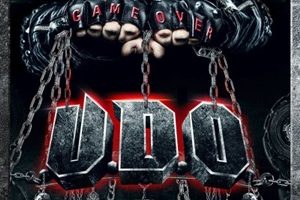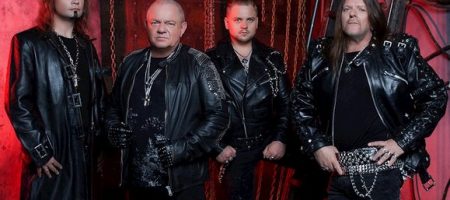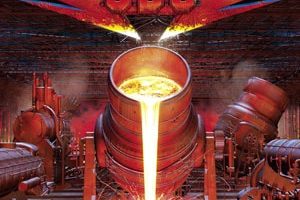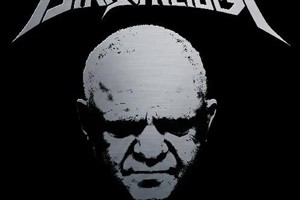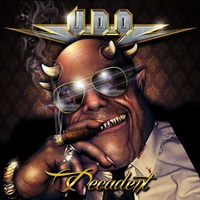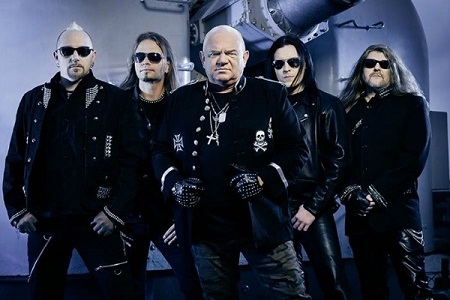U.D.O. – The Tank Rolls On
Sunday, 7th November 2021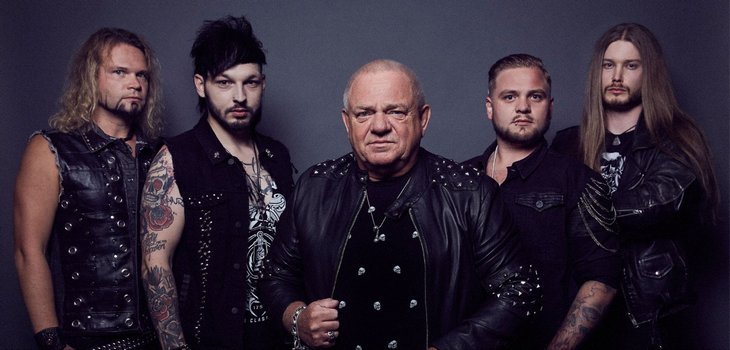
Even a global pandemic couldn’t slow down veteran vocalist Udo Dirkschneider. He worked on releases with an orchestra for We Are One, released a three song EP featuring some of his old Accept bandmates for Dirkschneider and the Old Gang, plus recorded and released a live album with U.D.O. from Bulgaria. And now we arrive at the latest U.D.O. studio album Game Over – featuring another blistering set of heavy metal just as we’ve come to know and love from the German metal tank. Surrounding himself with a solid set of younger musicians, he is able to balance the expected anthemic heavy metal he’s known for with the benefit of youthful energy and a modern outlook.
We reached out to Udo once again to bring us up to speed on the different songwriting/ recording process the band took for Game Over, the cover art, thoughts on being with AFM Records all these years, why Faceless World is an underrated record in the back catalog, plus thoughts on the social/political topics he tackled for the lyrics on this go around.
Dead Rhetoric: Game Over is the newest U.D.O. album – and the first effort with your latest bassist Tilen Hudrap and second guitarist Fabian Dee Dammers. Tell us how the recording and songwriting sessions went for this effort – and did the pandemic allow you to really put more time, effort, and focus on the little details to make things even more satisfying in the end?
Udo Dirkschneider: Let’s say the recording thing was a little bit different than how we do things normally. Normally we start putting all the ideas, see if we have enough, and then once we do go into the rehearsal rooms, the studio, and start together working on the arrangements, working with the producer. This was not possible this time, it was not possible with the pandemic to be in the same room, you know? We did everything over Zoom, Facetime, Skype, Whats App, over the conference calls, and then we would change things here and there, wait for a link, listen to it, make the changes. It was a little bit more time, and not normal for us.
The main recording in the studio, we were only allowed to have two people at a time in the studio. The engineer and one musician. Normally I am in there the whole time, watching the guitar players and such. In the end, I’m very happy with the results of the new album, especially with the two guitar players working together with Zoom and Skype working together. What can I say, I’m really happy with the new album.
Dead Rhetoric: Spending so much time over the previous years performing as Dirkschneider all the Accept classics, do you think this may have had even more of an effect to the new album having more of an older edge, specifically with songs like “Prophecy”, “Fear Detector”, “Metal Never Dies” and “Midnight Stranger”?
Dirkschneider: No, I think this happened more on Steelfactory. After this Dirkschneider tour where we performed Accept songs for three years, that was maybe a little more on that album. On this new album, no. Andre I’ve been together with for ten years, but he wasn’t just the main songwriter for the new album. I wrote with everybody. Tilen the new bass player, Fabian did a lot of stuff, Sven my son did a lot of work. This was the first time Sven and I did a lot of the lyrics together, he helped me with a lot of the melodies. Everybody was working together, it wasn’t like this is my song, you cannot touch it. In a way, this made the album more interesting. There is a good mix of songs – fast songs, mid-tempo songs, ballads, everything you know. A lot of melodies and some really good guitar work on this album.
Dead Rhetoric: Subjects such as global climate change, peace problems, shooting amongst minors are some of the topics covered on this album. Does it surprise you on an international scale how humanity hasn’t really evolved or solved some of these problems on Earth – do you believe they’ve gotten worse over time?
Dirkschneider: Oh yeah. There are a lot of things we put lyric-wise on the album. “Holy Invaders” is a song that is very topical for the moment, especially in a place like Afghanistan where the government tells you what type of religion you have to do. This is impossible, you can make your own religion, it shouldn’t matter what type of religion you are into. “Kids and Guns”, it’s against weapons. It’s better to talk to each other than to kill each other. And then we have “Metal Never Dies” which is more of a metal thing, it’s also a biography about myself. In the beginning I had nothing to say, and now I have a lot of things to say. “Marching Tank” for example is also about me. My son came up with the topic, in Germany you are referred to as a tank, always moving forward and you don’t want to stop. The ballad “Don’t Want to Say Goodbye” is a very personal thing, you can use this if someone is dying, your wife left you, girlfriend/boyfriend, sometimes you don’t want to say goodbye. Things will happen around you.
“Speed Seeker”, a lot of people are living too fast and they want to make things go too fast. This is a little bit about the lyrics on this album. And of course, Game Over the title of the album, that came up during the recording session. There are a lot of things that came up – everything is game over, we are not doing what we are normally doing. It’s about the things with the climates going on in the southern Europe, in America, in Russia, in Siberia. Also with the flood that we had in Europe. We have to take care of more things, or else we will have a lot of game overs, you know?
Dead Rhetoric: Who designed the cover art this time around – as it certainly portrays a ‘metal’ lifestyle with the symbolism of crosses, skulls, the five-star emblem, chains, and leather, studded gloves?
Dirkschneider: Yeah. A guy came from the north of Germany and said he had an idea for this. Our producer knew this guy, he had done some stuff previously for Anvil. I don’t have the name at the moment. He had an idea with the fist with the gloves, putting Game Over on it. And other things hanging around. I think it’s a typical metal cover, and it works.
Dead Rhetoric: What can you tell us about the video shoot for “Prophecy” – as it’s a combination of band performance footage and a narrative concept? Do they line up with the lyrical content, or was this an original idea worked out between the band and the film crew/director?
Dirkschneider: “Prophecy” I was watching a documentary a long time ago about sex. It was very interesting to see on tv, and also that people wanted to die after having sex. That’s where the idea came from, and in the video you can see the whole story.
Dead Rhetoric: What sense do you have when it comes to live shows/festivals coming out of the pandemic after eighteen plus months without consistent shows? Do you believe there will be a new hunger and appreciation for entertainment that may have been forgotten or taken for granted before – from the musicians, fans, venues, promoters, etc.?
Dirkschneider: Yeah for us we did the first show of the year, in Belgium the Alcatraz festival. And that was a real emotional feeling, for us also after eleven months not playing. We did this under Dirkschneider only doing Accept songs, this was planned at this festival for 2020. And it was planned to do the Metal Heart anniversary show. They moved it to this year, that was the reason why we only played the Accept songs. It doesn’t matter what songs we are playing, to be back on stage in front of people, it was an amazing evening.
Dead Rhetoric: When you look at your body of recorded work for U.D.O., is there a specific album (or albums) that you think maybe didn’t get the right credit it deserves as far as quality or respect that you wish people would give more time and opportunity to listen to?
Dirkschneider: Yes, a good example may be way back with the Faceless World album. With this album we were using keyboards for the first time, different stuff, different arrangements. People said, oh no – this is like U.D.O. with keyboards. After the album came out in 1990 – now people talk about it being a really great album. Some albums, they take some time before the people realize it’s a good album. I would say every U.D.O. album is a little bit different, in a way. In one direction, sometimes with more melodies, sometimes more aggressive. That I think is a good thing.
Dead Rhetoric: How do you see the evolution of heavy metal, now that it’s over fifty years old? What are things you enjoy, and where do you think there may need to be improvements or adjustments made?
Dirkschneider: I’m still enjoying the whole thing. Thank god I was quite busy, during the pandemic. I did a lot of work, the We Are One album with the orchestra, the live album for the Bulgaria show, Dirkschneider and the Gang with that EP, and the Game Over album. I still enjoy what I am doing. I have a lot of people asking me when I am thinking about retiring. No, come on – this is nothing for me. As long as I’m healthy and my voice is working, we can tour worldwide, and there is no reason to stop.
Dead Rhetoric: Surrounding yourself with younger musicians, do you believe their approach and ability to gain knowledge/insight quicker thanks to modern technology with social media and instant communication allows you to stay vital and current without sacrificing your quality as an artist?
Dirkschneider: Yes, this is a good thing to have these young people around me. I’m not really into social media and all that stuff. Let’s say a good thing about this whole recording, I was learning more about computers and to use this. These young people, they know what is going on, sending new ideas. My son and Dee, they are doing a lot of stuff with social media, it’s good to have. It’s good to have young people around me in the band, it’s a new generation with more modern ideas. It’s important for me to be open-minded, and I am definitely open-minded.
Dead Rhetoric: How do you feel about the work of AFM Records as your label that you’ve been with 2004 with Thunderball? What makes them the perfect partner to work with after all these years?
Dirkschneider: It’s more like a family to me. You can talk to each other, what we have to do, where we have to put more power on. Everybody knows each other, it’s a good thing. If you go to another record company, a lot of other record companies are not doing these type of accommodations. Especially when it comes to the money. I am very happy with AFM and I hope to continue working with them for a long time. We will see, you never know.
Dead Rhetoric: You’ve done many great duets and guest appearances over the years – what do you consider some of the most special moments in that regard? And are there any other artists you would love to collaborate with down the line that haven’t been able to happen as of yet?
Dirkschneider: I did a lot of stuff. I worked with Doro Pesch, stuff with Lordi. I cannot really say at the moment there is someone else I want to work with.
Dead Rhetoric: What’s on the schedule for you with U.D.O. over the next year – and are there any other recordings on the horizon, as I would imagine retirement is not in the cards for a long time as long as you are vital and healthy?
Dirkschneider: At the moment, the most important thing is having life go back to normal. We will start touring. Definitely we are looking forward for us to start touring again. If everything will happen, the whole next year will be full of touring. Maybe at the end of the year, slowly start working on a new album. Everybody is waiting to go back on stage.











